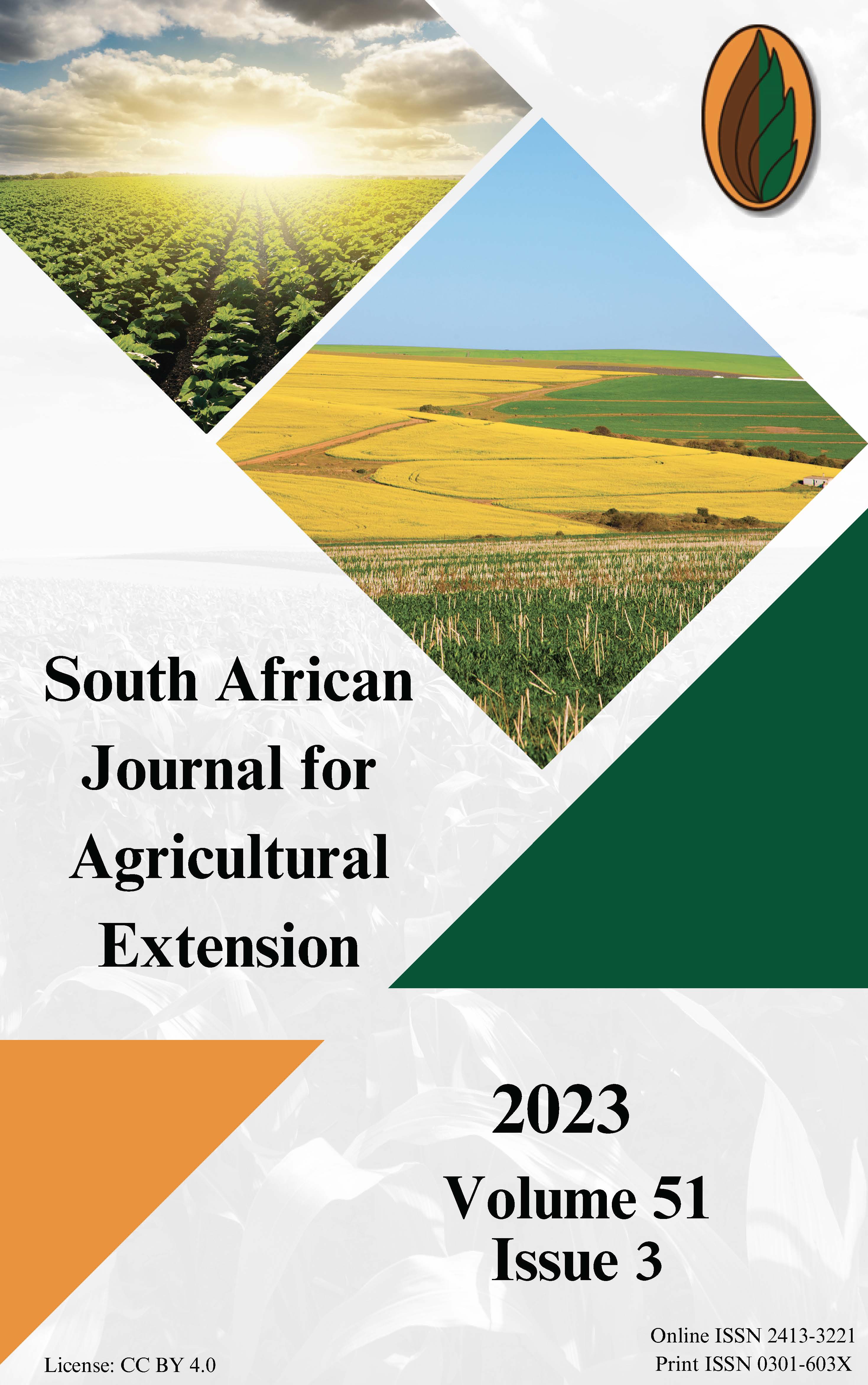Identifying the Causes of Failure in the Communal Property Associations (CPAs), State Owned and Household Farms
DOI:
https://doi.org/10.17159/2413-3221/2023/v51n3a13351Keywords:
Decision Makers, Women in Executive, Input Costs, Access to MarketsAbstract
CPAs, state-owned and household citrus farmers, are important within the citrus fruit group by value and volume. Their success could increase exports, job opportunities, foreign exchange revenue, rural development, and economic growth. This study provides the results of the causes of failure in the CPA's, state-owned and household citrus farms in Mpumalanga Province. The study used primary data collected from a random sample of 150 citrus farm managers, and SPSS was used to analyse the results. The causes of failure within these farming sectors are linked to a lack of participation in drafting business plans. In the study area, government departments or agencies drafted business plans for farmers. Farmers preferred the employment of direct or extended owners, relatives/family members with little experience in managing a farm business, yet they were not competent in managing the farms viably. The high input costs were the biggest cause of failure, and farmers sometimes could not ensure that irrigation water was available when needed. An increased protectionism in the lucrative markets was also listed as one of the causes affecting all farmers; hence, farmers could not access any new markets. This study thus recommends the involvement of farmers in the drafting of business plans and the employment of more local community members with skills in farming, sound farming experience and improved level of education.
Downloads
References
BUSINESS TRUST & DEPARTMENT OF PROVINCIAL LOCAL GOVERNMENT (DPLG)., 2007. Motherwell nodal economic profiling project. Available from https://www.btrust.org.za/library/assets/uploads/documents/6_CIPPN_Motherwell%20narrative.pdf
CHEPAPE, R.M. & MAOBA, S., 2020. Impact of agricultural developmental programmes on smallholder farmers of Bronkhorstspruit Region in Tshwane Metropolitan Municipality, Gauteng Province. S. Afr. J. Agric. Ext., 48(1): 31 – 41.
CITRUS GROWERS’ ASSOCIATION-GROWER DEVELOPMENT COMPANY (CGA)., 2018. Annual report 2017/18. CGA, Grower Development Company.
DEPARTMENT OF AGRICULTURE, FORESTRY AND FISHERIES (DAFF)., 2020. A profile of the South African citrus market value chain. Pretoria: Directorate Marketing.
DEPARTMENT OF RURAL DEVELOPMENT AND LAND REFORM (DRDLR)., 2013. Policy for the recapitalisation and development programme of Department of Rural Development and Land Reform. Pretoria.
KHAPAYI, M. & CELLIERS, P.R., 2016. Factors limiting and preventing emerging farmers to progress to commercial agricultural farming in the King William’s Town area of the Eastern Cape Province, South Africa. S. Afr. J. Agric. Ext., 44(1): 2 – 41.
MAHLALELA, T., 2013. A study of land reform and its impact in the Greater Letaba Local Municipality of the Mopani District in the Limpopo Province. Doctoral thesis, University of KwaZulu Natal.
MAHULE, S.G. (2015). Exploration of contributing factors leading to a decrease in agricultural productivity in resituated farms of Ehlanzeni District Mpumalanga Province. Master’s dissertations, Stellenbosch University, Cape Town.
METISO, H. & TSVAKIRAI, C.Z., 2019. Factors affecting small-scale sugarcane production in Nkomazi Local Municipality in Mpumalanga Province, South Africa. S. Afr. J. Agric. Ext., 47(4): 1 – 8.
MKHONTO, L.P. & MUSUNDIRE, A., 2019. Agricultural production inputs support programme as a socioeconomic development strategy. S. Afr. J. Agric. Ext., 47(4): 46 – 58.
MUKHARI, D.J., 2016. The impact of land redistribution on the livelihoods of beneficiaries: A case of Molwama Polokwane, Limpopo Province. Master’s dissertations, University of Limpopo.
SEBOLA, M.P., 2018. Financing emerging black farmers for agricultural development in South Africa: A wasteful and unworkable model for creating black farmers. The J. Transdiscipl. Res. S. Afr., 14(1): 1817-4434.
STEVENS, J.B., 2017. Is agricultural extension positioned to promote agripreneurship in South Africa? S. Afr. J. Agric. Ext., 45(2): 86 – 94.
STAAL, B.M., 2019. Land reform in South Africa: A case study of the Witzenberg Pals initiative. Master’s dissertation, Stellenbosch University, Cape Town.
STANDARD BANK AGRIBUSINESS SOUTH AFRICA (SBSA)., 2013. Finance and farm management. 5th ed. Johannesburg: The Standard Bank of South Africa Limited.
ZWANE, E.M. & VAN NIEKERK, J.A., 2017. The perceptions and attitudes of small-scale cane growers’ offspring towards farming and implications for sustainability: A case study of KwaZulu Natal North Coast, South Africa. J. Hum. Ecol., 60(1): 1-8.
WOODS, M.B., 2013. Essential guide to marketing planning. 3rd ed. Edinburgh Gate, United Kingdom: Pearson Education Limited.
Downloads
Published
Issue
Section
License
Copyright (c) 2023 T.D. Manenzhe, E.M. Zwane, J.A. Van Niekerk

This work is licensed under a Creative Commons Attribution 4.0 International License.








.png)